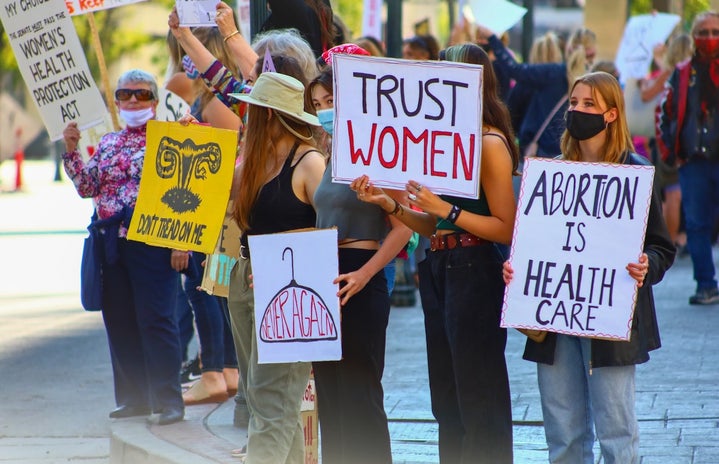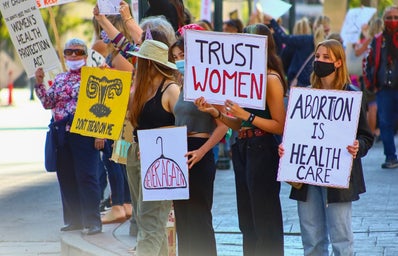The 1973 Supreme Court decision in Roe v. Wade legalized abortion in the first trimester of pregnancy and ruled that a state law forbidding abortions, except to preserve the life of the mother, was unconstitutional under the 14th Amendment. However, the ruling is currently in jeopardy of being overturned by the conservative Supreme Court majority according to a leaked draft opinion by Politico — though the Court has not yet announced a formal decision.
According to Diverse: Issues in Higher Education, college campuses are at the core of reproductive rights organizing, which also includes anti-abortion student groups. In both cases, young adults have helped dictate the terms of the debate since they are the people most likely to be affected because they are often around reproductive age and will be for a while. Dr. Gretchen Ely, professor and Director of the PhD Program at the University of Tennessee, Knoxville (UTK), College of Social Work (CSW), and a faculty affiliate in the UTK Women, Gender & Sexuality Studies Program at The University of Tennessee Knoxville, tells Her Campus that the services already offered at college health centers are broad and vary between campuses. “Some of the reproductive health services that student health centers might include are physical exams, Pap testing, contraception, emergency contraception, STI testing, pregnancy testing, and pregnancy counseling,” she says.
Many students’ rights to reproductive autonomy relies upon the location of their college or university. According to BestColleges, out of all 50 states, both California and Texas have the most college students, with 2.71 million and 1.64 million respectively who could be affected by their school health center’s response to possible changes in abortion laws. Both states take drastically contrasting approaches to students’ reproductive rights: California laws extend access to reproductive services, like abortion, while Texas has an abortion ban in practice.
Later confirmation of pregnancy is higher among young people, indicating that bans on abortion within the first trimester will disproportionately harm these populations.
In 2019, California governor Gavin Newsom signed Senate Bill 24, the College Student Right to Access Act, designating California as the first state to necessitate state universities to provide medication abortion resources via an on-campus source. The universities, which include the 23 California State University campuses and the nine University of California campuses, have until January 2023 to comply with the bill. The College Student Right to Access Act also includes a dedication by the state to fund the health centers of the universities to supply on-campus medication abortion.
However, this is not the reality on other college campuses. When Texas Senate Bill 8 went into effect on September 1, 2021, over 1.5 million college students enrolled at a Texas college or university lost the right to reproductive freedom. The law places a $10,000 bounty on the head of medical providers and others who help an individual gain abortion care, and bans abortion after six weeks — but this may be as soon as two weeks after a missed period based on a normal menstrual cycle.
According to a 2021 article by the University of California San Francisco, one in three people verify their pregnancies past six weeks, and one in five confirm after seven weeks. Later confirmation of pregnancy is also higher among young people, indicating that bans on abortion within the first trimester will disproportionately harm these populations. According to a 2019 study by the CDC, in Texas, 16,647 (29.1%) out of 57,275 abortions were performed on women between the ages of 20 to 24, and 5,041 abortions (8.8%) were performed on women between the ages of 15 and 19. Eight other states discussed similar bills to Texas’s SB 8 within a month of it going into effect. California is still currently the only state with a law legalizing a college student’s right to abortion services.
“To support students living in states where abortion is criminalized post-Roe, student health centers need to be prepared to refer students to other states to get abortion care.”
Abortion will be criminalized in numerous states, especially in the South and Midwest, if Roe is overturned. According to Ely, college health centers must prepare themselves to better support their students seeking abortions. “To support students living in states where abortion is criminalized post-Roe, student health centers need to be prepared to refer students to other states to get abortion care,” she says. “These referrals need to be comprehensive, and include information about travel and lodging, and information about how to get support from abortion funds if a student does not have the resources to travel for abortion care.” She explains that abortion funds help people pay for unaffordable abortion expenses, and adds, “It would be helpful to have a social worker or helping professional within a student clinic who is knowledgeable about how to provide these kinds of comprehensive referrals.”
Students attending college outside of their home state may also be disproportionately affected. Students may have to travel off-campus to obtain abortion pills, which may demand them to travel far distances on public transportation due to a limited amount of abortion providers, especially in states with large geographic gaps. Ms. Magazine found that public university students in Massachusetts had to travel between two and 42 miles to acquire an abortion pill at off-campus clinics. If the student utilized public transportation, they traveled for anywhere from 18 to 400 minutes one way to the nearest abortion clinic. As many as 93% of students at these public universities lived over 30 minutes via public transportation from the most nearby abortion facility. Ely tells Her Campus that colleges may need to prepare themselves for more requests for crisis assistance.
“Students who can access an abortion near their campus or in their state might be able to navigate that without much help. However, traveling out-of-state for abortion care is expensive and time-consuming and it may create more disruption, depending on how accessible abortion was in the first place,” she says. “When abortion is criminalized, it can create a sense of desperation if someone wants to terminate a pregnancy but the person is not sure what to do or where to go. This can exacerbate stress.”
Access to abortions and reproductive rights is also an equity issue that has a large difference at the college level.
Ely also pointed out that students might seek out their own abortion services, such as obtaining medication via mail. “Student health centers may need to prepare for questions or requests about these medications. Students may also face health emergencies because abortion is criminalized. Student health centers will need to plan for these types of situations in advance.”
Access to abortions and reproductive rights is also an equity issue that has a large difference at the college level. Abortion patients are more likely to be people of color and of a lower socioeconomic status. According to the Kaiser Family Foundation, in 2019, people of color comprised 44% of the population but 81% of the people receiving abortions. This trend exists in states like Texas with the number being 59% versus 74%, Alabama being 35% versus 69% and Louisiana being 42% versus 72%.
According to PBS SoCal, women of color residing in states with restrictive abortion laws often have limited access to health care and inadequate options for birth control. Schools in these areas also often lack sufficient sex education. According to MarketWatch, in 2019, 75% of women who obtain abortions classify as low-income, and nearly half survive below the federal poverty level. These women will most likely have the most difficult time traveling to other states to either receive an abortion or raise chaildren that they may struggle to financially support. People of color and those from low-income households are less likely to have a college degree.
Colleges right now must do all they can to support their students during this stressful and scary time.
As of 2018, while 35% of white Americans had a college degree, about 25% of Black Americans and 18% of Hispanic Americans had college degrees. Children from poorer households were less likely to attend college and earn a four-year degree than those from higher socioeconomic status families, according to 2019 data from the National Communication Association. Refusing reproductive choice to students simultaneously facing higher education barriers only increases inequality and a lack of diversity in colleges.
To make change on campus, students can urge their health centers to offer family planning services, and they can call upon their school to voice its support of reproductive choice. Students can also lobby at the state and national level for laws and policies that increase access to abortion services by contacting the member of your congressional district.
Colleges right now must do all they can to support their students during this stressful and scary time.
Many students are anxious about their future, and schools must take initiative to offer their students the resources and support necessary. If you’re currently feeling stressed, scared, anxious, or all of the above, you’re not alone. Virtual therapy platforms are available to support those who are struggling, and organizations like Planned Parenthood are still providing their services and accepting donations.


